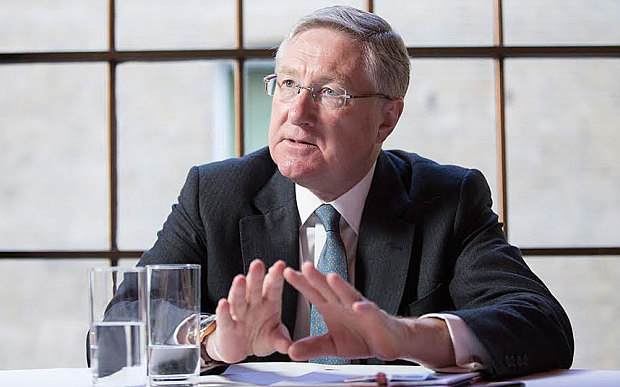Andrew Critchlow
Britain’s export credit agency targets small business as banks retreat

As more British companies begin to look overseas to tap new markets, the pressure is on George Osborne, the Chancellor, who has set a target to double the value of exports to £1 trillion by 2020, to provide greater financial support to businesses selling abroad.
Traditionally, British companies were able to draw upon the financial clout of the City and the nation’s banks to help underwrite overseas projects and exports with letters of credit. But since the financial crisis most lenders have retrenched and become increasingly risk averse. That has breathed new life back into Britain’s recently re-named trade credit guarantee agency, UK Export Finance.
David Godfrey, chief executive of UK Export Finance, believes the £1 trillion figure is merely “an aspiration target; what’s more important is what it is doing to galvanise the private and government sectors to maximise their performance”.
Godfrey’s organisation, which is funded by the Treasury, is now the first port of call for many of the country’s biggest companies needing trade guarantees, underwriting services, letters of credit and even direct loans to support exports all over the world.
Without this key financial support, many higher-risk but high-growth markets would essentially be off limits to British businesses unable to secure help from the major banks since the financial crisis.
The latest example of the agency’s willingness to support British business came this month during the London Metal Exchange Week. Godfrey offered around £600m of potential credit lines – which could include direct lending – to Aurora Williams, Chile’s minister of mines, to support British deals with Chile’s state-owned Codelco, the world’s largest copper producer.
“Direct lending is really important. It now gives us a range of tools that is second to none amongst export credit agencies,” he explains.
Under the Direct Lending Facility scheme, the Treasury has provided UK Export Finance with a £3bn pot to dole out to British exporters and Godfrey says that he would be “straight on the phone to the Chancellor” if a big deal came along that needed more funding.
The construction group Carillion was the first to benefit from the scheme this month, when the agency helped to arrange £75m of finance to support a contract with the Dubai World Trade Centre.
To deliver the scheme, it has teamed up with a number of major international lenders in key markets, including Bank of China, Ecobank Nigeria, Natixis, Deutsche Bank and HSBC.
“The department has gone through huge change over the last 10 years and the main catalyst for that was the financial crisis,” he explains.
“Up until the crisis, a lot of people in business and government were asking, was there really a need for an export credit agency any more? Can the financial markets and the banks actually provide all the support for industry? Export credit is a subsidy and we’re not in favour of subsidies, so why do you need one?”
Formerly known as the Export Credit Guarantee Department, or ECGD, the agency was created soon after the First World War in 1919 as the government tried to revive Britain’s shattered post-war economy by boosting exports.
Godfrey, who has previously worked at JP Morgan and Lloyds, took charge as chief executive last year. Five years on from the global financial crisis, the Government is once again turning to the agency, now renamed UK Export Finance, to help rebuild Britain’s economy by leading a charge to boost exports.
“As a result of the financial crisis there was recognition that you do need what I call micro levers of financial support for exporters, you do need this support when financial markets are fractured.
“We saw the banks withdraw and that was the catalyst for the Government to say that we need to provide more support via our export credit agency and that’s when we got back into the short-term products, basically the support for exporters,” he says.
In total, the agency has about £20bn of total liabilities on its balance sheet, but it has recently shifted focus to helping more small businesses obtain the financial support and guarantees they require to tap into fast growing markets in Asia, Africa and the Middle East.
As part of this drive, it has doubled its number of regional export finance advisers and now has 24 working throughout the UK helping small businesses to make the leap into exporting.
“People used to think of us as just supporting big capital goods exporters, they did not think of us supporting smaller enterprises, cheese exporters, and funnily enough neither did we. If you ask the banks, they will say ‘no we’re still there’. But there is no doubt in my mind that they have withdrawn, their balance sheets have shrunk and I think one of the consequences of the financial crisis is that they have become less international and more domestic.”
He cites the partly government-owned Lloyds Banking Group as an example of a large British financial institution that has become increasingly risk-averse in terms of supporting business overseas.
“Banks have become more selective. They will support the companies that are already there, but the competition for business that used to happen before the crisis we don’t see as much. People tend to go with their house bank.”
UK Export Finance is now supporting more trade overseas and this year will, according to Godfrey, exceed the £2.3bn of total exposure it took on in 2013. “What we’re seeing this year is that the number of aircraft sales we support will probably only be half of what we supported in 2010. This is not because Airbus are selling fewer planes than before, it’s because the banking markets are very competitive and actually quite aggressive for that kind of business, because it is high value and low risk. But for the business they don’t want to do, there is no market at all, so I think we have a very bifurcated financing market right now,” he says.

According to Godfrey, UK Export Finance is seeing very strong growth for its services in the Midlands and the South East, but some areas of the country continue to lag behind in terms of the number of companies exporting that it can support.
Companies in some regions, such as Northern Ireland, have found it harder to obtain bank guarantees to support exports and trade since the financial crisis, he explains, and this has increased the need for UK Export Finance to provide coverage.
“We are working on that because there are a number of companies in Northern Ireland that could benefit from our support.
“There is a lot of competition for high visibility projects, but there are also a lot of people who still struggle to get financing support. Banks have become much more risk averse and even if you have a good business, banks are more nervous about taking on risk,” he continues.
UK Export Finance is also on the front lines when it comes to supporting British business in high risk markets and potentially new frontiers that were previously shut off by sanctions. Sanctions against Russia have already started to hit British business.
“People are very concerned and business is certainly slowing down with Russia. Sanctions are having an impact and they are slowing down work that is going on with projects,” says Godfrey.
“We were very quickly back into Iraq and Libya and we keep an eye on what is going on in countries like Iran, both the economic situation and the political situation. If the politics allows us to go into a country, we can make a very quick decision on what kind of cover we’re prepared to offer. It may be just short-term cover or we may decide for strategic reasons that we would be prepared to work on things like infrastructure projects,” he says.
One area that Godfrey is clear on is that British business is better served as part of the European Union than outside.
“I personally think – along with most business leaders –that we gain an awful lot from being part of the EU. I think it’s critical and very important for us,” he warned.
RELATED ARTICLES

Funding Circle Raises $65 Million for Peer-to-Peer Small Business Loan
Venture capital firms have come to see small business lending as an industry ripe forRead More

Moms Build a Small Business on Better Tissues
In 2007, Julie Pickens and Mindee Doney found a $16 million business hiding in theirRead More

Comments are Closed